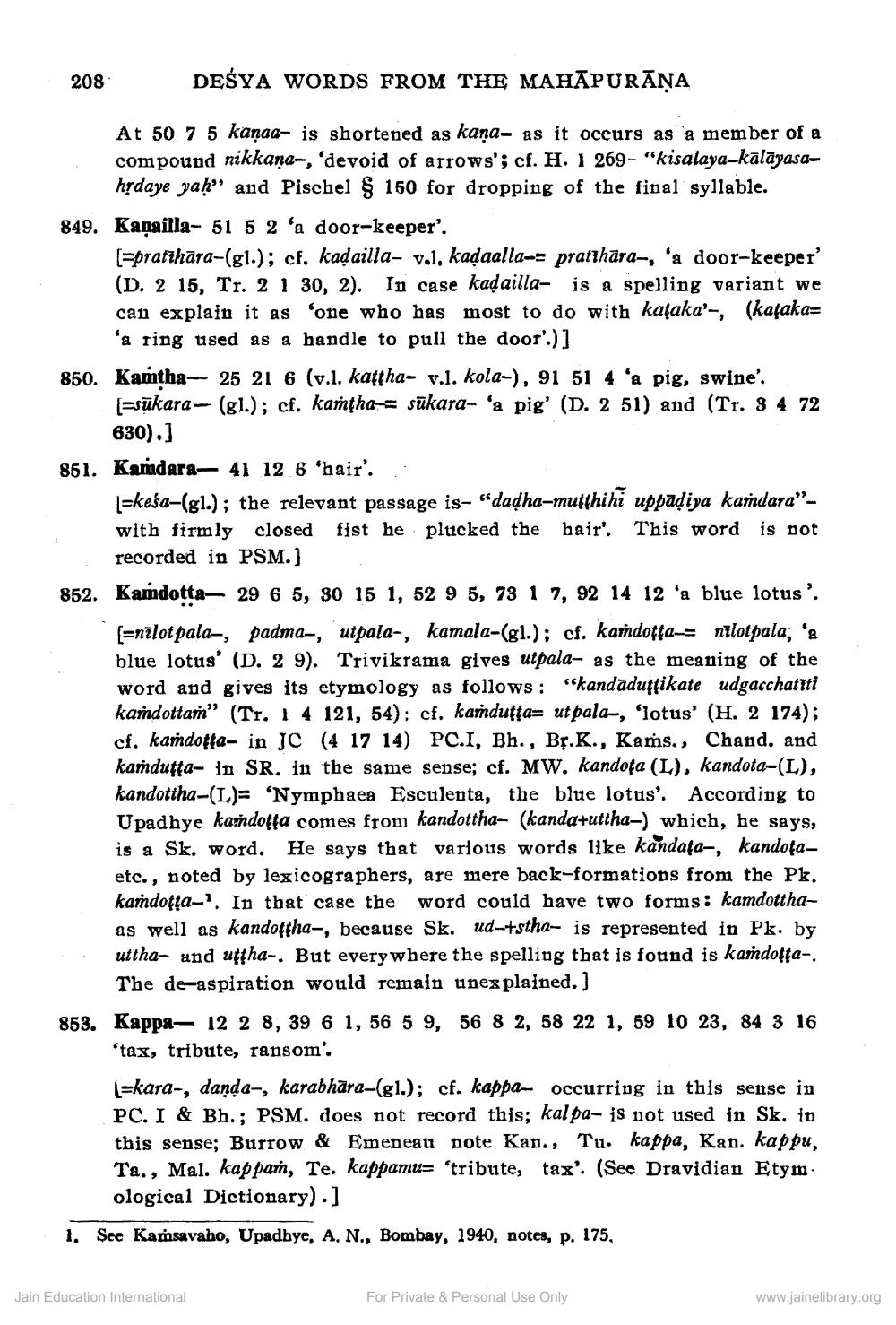________________
208
DEŚVA WORDS FROM THE MAHĀPURĀŅA
At 50 7 5 kanaa- is shortened as kaņa- as it occurs as a member of a compound nikkana-, 'devoid of arrows'; cf. H. 1 269- "kisalaya-kalayasa
hrdaye yah" and Pischel § 150 for dropping of the final syllable. 849. Kaņailla- 51 52 'a door-keeper'.
(=pratīhāra-(gl.); cf. kadailla- v.1, kadaalla-- pratihāra-, 'a door-keeper' (D. 2 15, Tr. 2 1 30, 2). In case kadailla- is a spelling variant we can explain it as 'one who has most to do with kataka'-, (kafaka=
'a ring used as a handle to pull the door'.)] 850. Kamtha - 25 21 6 (v.1. kattha- v.1. kola-), 91 51 4 'a pig, swine'.
[=sūkara- (gl.); cf. kartha= sūkara- 'a pig' (D. 2 51) and (Tr. 3 4 72
630).] 851. Kamdara- 41 12 6 'hair'.
(=keśa-(gl.); the relevant passage is "dadha-mutthihi uppadiya kandara"with firmly closed fist he plucked the hair'. This word is not
recorded in PSM.) 852. Kamdotta— 29 6 5, 30 15 1, 52 9 5, 73 1 7, 92 14 12 'a blue lotus'.
(=nilotpala-, padma-, utpala-, kamala-(gl.); cf. kardoffa-= nilotpala, 'a blue lotus' (D. 29). Trivikrama gives utpala- as the meaning of the word and gives its etymology as follows: "kandaduffikate udgacchatiti kaidottam" (Tr. I 4 121, 54): cf. kardutta= ut pala-, 'lotus' (H. 2 174); cf. kardofta, in JC (4 17 14) PC.I, Bh., Bp.K., Kams., Chand. and kaṁdufta- in SR, in the same sense; cf. MW. kandoga (L), kandota-(L), kandottha-(L)= 'Nymphaea Esculenta, the blue lotus'. According to Upadhye kandotta comes from kandottha- (kanda+uttha-) which, he says, is a Sk. word. He says that various words like kandafa-, kandotaetc., noted by lexicographers, are mere back-formations from the Pk. kardotta-. In that case the word could have two forms: kamdotthaas well as kandoftha-, because Sk.ud-+stha- is represented in Pk. by uttha- und uttha-, But every where the spelling that is found is kamdotta-,
The de-aspiration would remain unexplained. ) 853. Kappa- 12 2 8, 39 6 1, 56 5 9, 56 8 2, 58 22 1, 59 10 23, 84 3 16
‘tax, tribute, ransom'. (=kara-, danda-, karabhāra-(gl.); cf. kappa- occurring in this sense in PC. I & Bh.; PSM. does not record this; kalpa- is not used in Sk. in this sense; Burrow & Emeneau pote Kan., Tu. kappa, Kan. kappu, Ta., Mal. kappam, Te. kappamu= 'tribute, tax'. (See Dravidian Etym. ological Dictionary).]
1, Sce Kamsevaho, Upadhye, A. N., Bombay, 1940, notes, p. 175,
Jain Education International
For Private & Personal Use Only
www.jainelibrary.org




